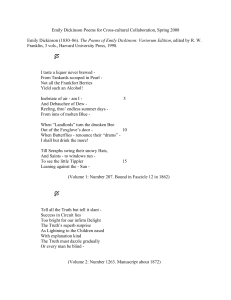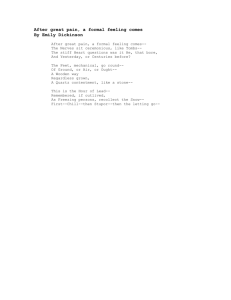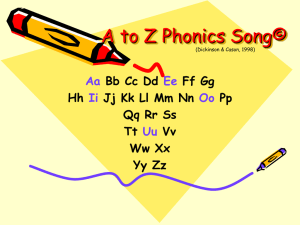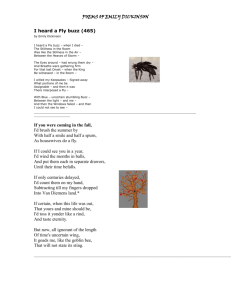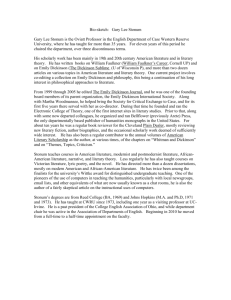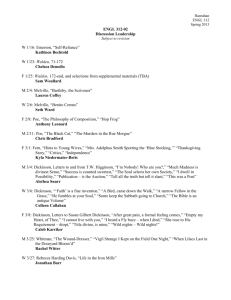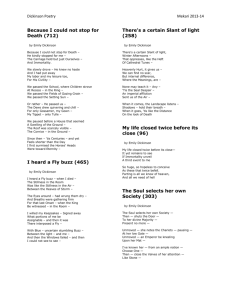christi's slide show
advertisement
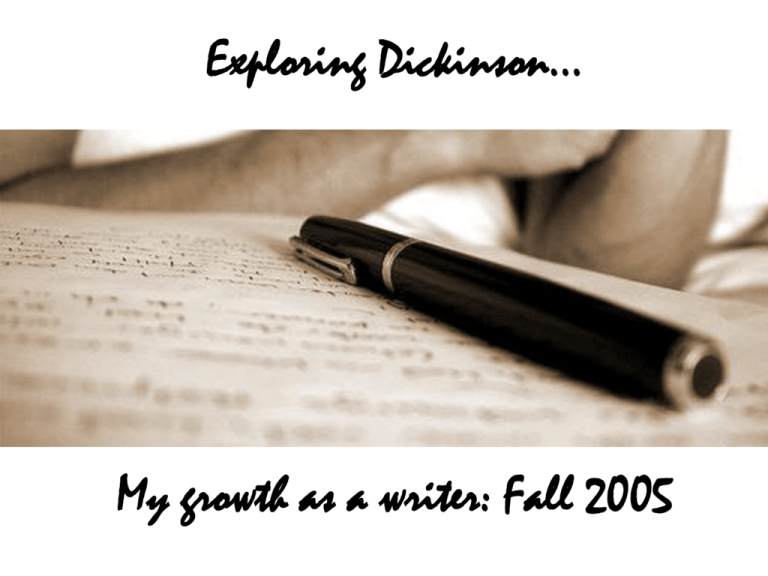
Exploring Dickinson… My growth as a writer: Fall 2005 This semester I focused primarily on poetry. Within my pieces I attempted to: •Mirror the style of Emily Dickinson •Incorporate better diction into my work •Write about diverse subjects I’ve learned a lot since I started writing poetry. Here’s an example of a piece I wrote while a sophomore in Creative Writing I: THE LIFEBOAT Love is a lifeboat, Languidly floundering upon the sea. Waves crash about my head, And threaten to prevail. Thrashing through the icy murk, I take hold of its side. Hands reach down and pull me, Into its serene interior. My fear is gone with the wind and waves, I sink into its gentle embrace, And know the worst is over. Has obvious problems with rhythm Shows little organization Anyone can slap words on a page that sound nice together… I wanted to write poetry with a definite form So I turned to the work of Emily Dickinson The first I read by Emily Dickinson is a famous one… XXXII Hope is a thing with feathers That perches in the soul, And sings the tune without the words, And never stops at all, And sweetest in the gale is heard; And sore must be the storm That could abash the little bird That kept so many warm. I’ve heard it in the chillest land, And on the strangest sea; Yet, never, in extremity, It asked a crumb of me. I was immediately drawn by her steady rhythms, fascinating subjects, organization, and natural rhyme So I set out to emulate her style. My first attempt at writing like Dickinson took pages and pages of editing before it sounded right… Creeping Mortality A sickness dwells within my bones It seems that none can see I daily hear its morbid tones – Creeping Mortality A weakness seems to rule my flesh Pernicious darkness there Pervading with a cruel finesse And leaving blank Despair The more I read her work, the more I discovered patterns in her writing. She used inverted word order. She wrote in iambic meter, usually with lines of six and eight syllables. She capitalized common nouns she thought important (e.g. Love, Death, Adversity, etc.) She often used dashes to isolate important words or phrases. The next week, writing in Dickinson’s style came more easily because I was more familiar with it. It’s true that you will write like what you read! A Different Shade How foreign does a frequent feel When I’ve been far away Though threads are same beneath my heel Seems strange the bed I lay Though walls reserve the same mem’ry Appear they different shade The shadows cast by ancient tree At noontime still do fade But sunset here seems paler hue Than when I said goodbye And now that I’ve come back to you It’s changed – I know not why. One of her poems directly inspired two pieces of my own: A poor torn heart, a tattered heart, That sat it down to rest, Nor noticed that the ebbing day Flowed silver to the west, Nor noticed night did soft descend Nor constellation burn, Intent upon the vision Of latitudes unknown. The angels happening that way, This dusty heart espied; Tenderly took is up from toil And carried it to God. There, - sandals for the barefoot; There, - gathered from the gales, Do the blue havens by the hand Lead the wandering sails. ~ Emily Dickinson Effortlessly Broken My unmarred heart, so ethereal Effortlessly broken Though still pure, gossamer shrouded Flesh that feels. Those caustic words pierce My indigenous shell Good diction Lacks definite rhythm and other stylistic devices Odd number of lines (rarely done by Dickinson) The Ebbing Day The ebbing day, it flows away Below the darkening clouds It’s melting down without a sound A brilliant puddle lay Then gathers, rushing, ever hushing Silent round my feet A glow invades and darkness fades On the day we meet “borrowed” the phrase “the ebbing day” unknowingly (this poem was written 2-3 months after reading Dickinson’s) it exhibits iambic meter with lines of 8 and 6 syllables rhyme found within the lines Variation in subject. (connotation of words) Encumbered A word is such a flimsy thing Yet carries so much weight Bags bulging implications Drag cumbrous in its wake How does it carry such a load Upon its spindly frame? If only we could see the depth Contained beneath a page! Uses phrasing more like Dickinson’s Iambic, 8-6 lines. Punctuation Characteristic Of Dickinson Recreants There I within a stony tow’r A zephyr stirs my hair And feckless I must watch the hour Remain, however, fair A lonely eye cast down below To spy them gallivant Recreants inspire my woe Yet serenades they grant Enamoring, they gain my heart Then deem my tow’r too high Renege their vow and, careless, part For sultry ‘nough, not I Longer than most of my other pieces. Uses words with altered syllables: “tow’r” “’nough” etc. Inverted word order. Iambic, 8-6 syllables. Sunsets frequent subject of my pieces. Cerulean to Indigo Describes sunsets as the accident of a painter. (man-made beauty never intentional) Some natural rhyme, no rhyme scheme. A painter dropped his palette It spilled upon the sky The colors, every hue, Seeping, shades intensify Cerulean to indigo Carmine enough Yellow ochre and vermilion Coalesce above Frenetic A zephyr dances by In rustling skirts and whispers soft Of grumbling men behind Her step aroused, she madly spins Dark visages appear And grisly gray seeps through the blue Trees murmur anxiously The foliage chorus rattles on The sun deserts the scene Soon oaks sway to her sultry dance Evergreens bowing low Frenetic nature all joins in A protuberant drop falls Iambic, 6-8 syllables Builds to climax Extended personification characteristic of Dickinson Last line 6 syllables for variety
